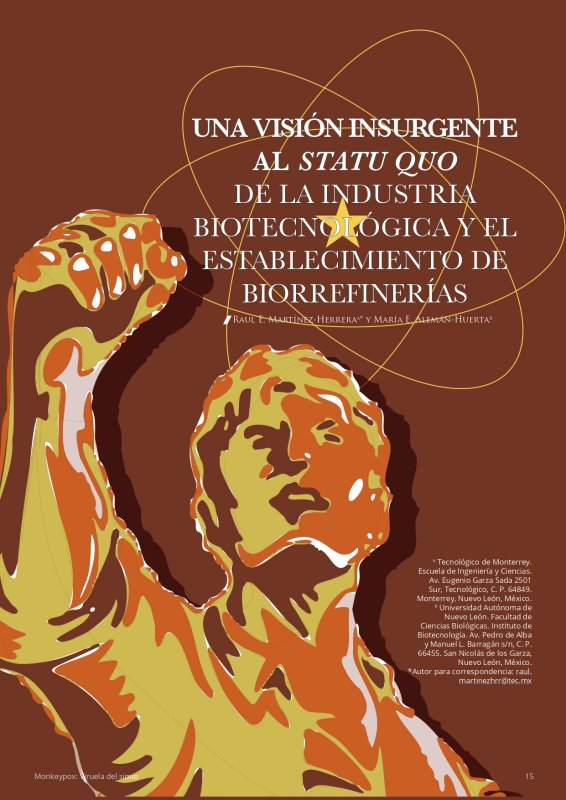Una visión insurgente al Statu Quo de la industria biotecnológica y el establecimiento de biorrefinerías
DOI:
https://doi.org/10.29105/bys5.10-70Keywords:
bioeconomy, biosociality, biotechnological insurgency, MarxismAbstract
The biorefinery concept was created with the intention to promote the sustainable use of natural resources and their conversion into biotechnological products with commercial value. However, the problem of environmental pollution and the low access to products of biotechnological origin such as vaccines, medicines and even food in vulnerable populations, show that the vision of social benefit, justice and equity has not been enough. For this, it is necessary to challenge the current state by promoting a multidisciplinary insurgency that primarily sees the socio-economic development of the several rural communities and the protection of native ecosystems. For this reason, this paper emphasizes a series of critical points that must be addressed before the installation of any biorefinery, based on an academic, governmental, and business cluster that operates in an integral way.
Downloads
References
Baez, C. 2017. Retos y oportunidades de la biorrefinería en México. En: http://www.cienciamx.com/index.php/tecnologia/energia/15937-retos-oportunidades-biorrefineria-mexico (consultado 30/01/2022).
• Barría, C. 2020. Vacuna contra la COVID-19 | "Hay un juego político, económico y estratégico detrás de las vacunas que es una receta para el desastre" En: https://www.bbc.com/mundo/noticias-53618082 (consultado 29/01/2022).
Bhagwat, G., K. Gray, S. P. Wilson, S. Muniyasamy, S. G. T. Vincent, R. Bush, T. Palanisami. 2020. Benchmarking Bioplastics: A Natural Step Towards a Sustainable Future. Journal of Polymers and the Environment. 28: 3055–3075. DOI: https://doi.org/10.1007/s10924-020-01830-8
Bhat, Z. F., J. D. Morton, S. L. Mason, A. E. A. Bekhit, H. F. Bhat. 2019. Technological, Regulatory, and Ethical Aspects of In Vitro Meat: A Future Slaughter‐Free Harvest. Comprehensive Reviews in Food Science and Food Safety. 18(4): 1192–1208. DOI: https://doi.org/10.1111/1541-4337.12473
Bellver-Capella, V. 2012. Biotecnología 2.0: las nuevas relaciones entre la biotecnología aplicada al ser humano y la sociedad. Persona y bioética. 16 (2): 87–107. DOI: https://doi.org/10.5294/pebi.2012.16.2.1
Cantley, M. 2004. How should public policy respond to the challenges of modern biotechnology? Current Opinion in Biotechnology. 15(3): 258–263. DOI: https://doi.org/10.1016/j.copbio.2004.04.007
Castillo, R. M. 2009. Biopiratería y pueblos indígenas: crítica y realidad. Revista Latinoamericana de Derechos Humanos. 20 (1): 27–38.
de Armas-Martínez, A. C., M. Morales Zamora, Y. Albernas Carvajal, E. González Suárez. 2019. Proyección de una industria azucarera para transformarse en una biorrefinería a partir de biocombustibles de segunda y tercera generación. Tecnología Química. 39 (3): 489–507.
Fernández Arner, A., A. G. Kohan. 2017. Marxismo y crisis ecológica. Economía y Desarrollo. 158 (1): 26–40.
Galanakis, C. M., G. Brunori, D. Chiaramonti, R. Matthews, C. Panoutsou, U. R. Fritsche. 2022. Bioeconomy and green recovery in a post-COVID-19 era. Science of The Total Environment. 808: 152180. DOI: https://doi.org/10.1016/j.scitotenv.2021.152180
García, M. T., L. C. Bórquez, S. C. Salinas. 2004. La biopiratería en Chiapas: un análisis sobre los nuevos caminos de la conquista biológica. Estudios Sociales. Revista de Alimentación Contemporánea y Desarrollo Regional. 12 (24): 56–89.
González, F. M. 2020. Resignificar la praxis educativa en tiempos de incertidumbre: un desafío para las organizaciones sociales. Revista de Ciencias Sociales. 26: 9–13.
Huerta González, A. 2013. Los problemas actuales del capitalismo son reflejo de su decadencia. Economía UNAM. 10 (30): 93–109. DOI: https://doi.org/10.1016/S1665-952X(13)72205-9
Kumar, B., N. Bhardwaj, K. Agrawal, V. Chaturvedi, P. Verma. 2020. Current perspective on pretreatment technologies using lignocellulosic biomass: An emerging biorefinery concept. Fuel Processing Technology. 199: 106244. DOI: https://doi.org/10.1016/j.fuproc.2019.106244
Leong, H. Y., C. K. Chang, K. S. Khoo, K. W. Chew, S. R. Chia, J. W. Lim, J. S. Chang, P. L. Show. 2021. Waste biorefinery towards a sustainable circular bioeconomy: a solution to global issues. Biotechnology for Biofuels, 14 (1): 87. DOI: https://doi.org/10.1186/s13068-021-01939-5
Martínez, K. C., M. E. Benitez, A. L. Ibarra, G. O. Castro, N. Ortega-Méndez, E. V. Martínez, A. S. Muñoz. 2021. Propuestas de Tecnologías de Innovación para Ciudades Sustentables: Más allá del COVID-19. Jóvenes en la Ciencia, 10.
Martínez-Herrera, R. E., O. M. Rutiaga-Quiñones, M. E. Alemán-Huerta. 2021. Integration of Agave plants into the polyhydroxybutyrate (PHB) production: A gift of the ancient Aztecs to the current bioworld. Industrial Crops and Products. 174: 114188. DOI: https://doi.org/10.1016/j.indcrop.2021.114188
Molina-Guerrero, C.E., A. Sánchez, E. Vázquez-Núñez. 2020. Energy potential of agricultural residues generated in Mexico and their use for butanol and electricity production under a biorefinery configuration. Environmental Science and Pollution Research. 27: 28607–28622. DOI: https://doi.org/10.1007/s11356-020-08430-y
Morales Zamora, M., A. C. de Armas Martínez, E. González Suárez, N. Ley Chong, G. Villanueva Ramos. 2021. La sinergia entre las biorrefinerías de azúcar y el desarrollo de la industria química en cuba. Revista Universidad y Sociedad. 13 (5): 81–91.
Núñez Jover, J., G. Figueroa Alfonso. 2014. Biotecnología y sociedad en Cuba: el caso del Centro de Inmunología Molecular. Trilogía Ciencia Tecnología Sociedad. 6(10). DOI: https://doi.org/10.22430/21457778.432
Palsson, G. 2015. Relaciones Biosociales de producción. Nómadas. (42): 89–109.
Sacramento-Rivero, J. C., G. Romero, E. Cortés-Rodríguez, E. Pech, S. Blanco-Rosete. 2010. Diagnóstico del desarrollo de biorrefinerías en México. Revista Mexicana de Ingeniería Química. 9 (3): 261–283.
Schroeder, D. 2007. Public Health, Ethics, and Functional Foods. Journal of Agricultural and Environmental Ethics. 20(3): 247–259. DOI: https://doi.org/10.1007/s10806-007-9033-1
Soria-López, M., I. Fuentes-Páramo. 2016. The identification of biopiracy in patents. World Patent Information. 47: 67–74. DOI: https://doi.org/10.1016/j.wpi.2016.10.003
Sosa-Rodríguez, F. S., J. Vazquez-Arenas. 2021. The biodiesel market in Mexico: Challenges and perspectives to overcome in Latin-American countries. Energy Conversion and Management: X. 12: 100149. DOI: https://doi.org/10.1016/j.ecmx.2021.100149
Vance, C., J. Sweeney, F. Murphey. 2022. Space, time, and sustainability: The status and future of life cycle assessment frameworks for novel biorefinery systems. Renewable and Sustainable Energy Reviews. 159: 112259. DOI: https://doi.org/10.1016/j.rser.2022.112259
Villasana, M. 2011. Fostering university–industry interactions under a triple helix model: the case of Nuevo Leon, Mexico. Science and Public Policy. 38(1): 43–53. DOI: https://doi.org/10.3152/030234211X12924093659996
Wibawa, T. 2020. COVID‐19 vaccine research and development: ethical issues. Tropical Medicine & International Health. 26(1): 14–19. DOI: https://doi.org/10.1111/tmi.13503







